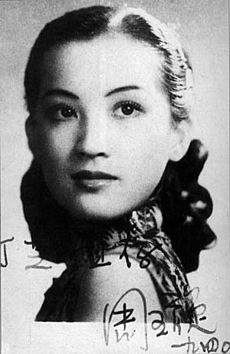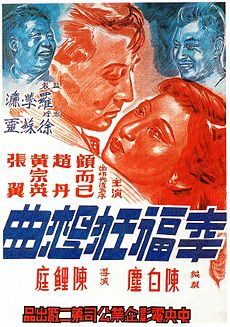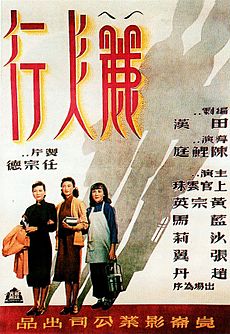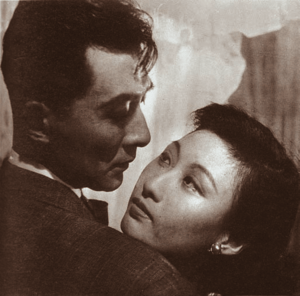Huang Zongying facts for kids
Quick facts for kids
Huang Zongying
|
|||||||||||
|---|---|---|---|---|---|---|---|---|---|---|---|
| 黄宗英 | |||||||||||
| Born | 13 July 1925 Beijing, China
|
||||||||||
| Died | 14 December 2020 (aged 95) Huadong Hospital, Shanghai, China
|
||||||||||
| Occupation | Actress, writer | ||||||||||
|
Notable work
|
Rhapsody of Happiness Crows and Sparrows Women Side by Side |
||||||||||
| Spouse(s) |
|
||||||||||
| Chinese name | |||||||||||
| Traditional Chinese | 黃宗英 | ||||||||||
| Simplified Chinese | 黄宗英 | ||||||||||
|
|||||||||||
Huang Zongying (Chinese: 黄宗英; 13 July 1925 – 14 December 2020) was a famous Chinese actress and writer. She starred in many black-and-white films. Some of her well-known movies include Rhapsody of Happiness (1947), Crows and Sparrows (1949), and Women Side by Side (1949). Her third husband, Zhao Dan, often acted alongside her in these films.
In the mid-1950s, Huang Zongying started writing film scripts. Later, she became a highly praised writer of reportage literature. This type of writing tells true stories, often based on interviews and research. She won the National Award for Outstanding Reportage Literature three times for her works. These included "The Flight of the Wild-Geese", "Mandarin Oranges", and "The Wooden Cabin".
Huang Zongying was married four times. Her marriage to actor Zhao Dan lasted 32 years until he passed away in 1980. Later in her life, she married the writer Feng Yidai. She also helped raise Zhao Dan's two children from his earlier marriage. She also adopted the two sons of the famous singer and actress Zhou Xuan, who had become orphans.
In 2005, Huang Zongying and Zhao Dan were both honored. They were named among the "100 best actors of the 100 years of Chinese cinema". Their love story was even turned into two movies by director Peng Xiaolian. One of these films was Shanghai Rumba (2006).
Contents
Early Life and Family Background
Huang Zongying was born in 1925 in Beijing, China. Her family was well-known for its scholars and government officials. Her family originally came from Rui'an in Zhejiang Province. Both her grandfather and great-grandfather had earned the jinshi degree. This was the highest degree someone could get in the old imperial exams.
Her father, Huang Cengming, was an engineer who studied in Japan. Her mother, Chen Cong, was a well-educated housewife. Both parents believed in modern ideas and let their children follow their own interests. Sadly, her father died when she was only nine years old. After his death, her family faced financial difficulties.
Huang Zongying was greatly inspired by her oldest brother, Huang Zongjiang. He became a very successful playwright, someone who writes plays. Because of him, Huang Zongying grew to love arts and literature. When she was nine, she read an essay by Bing Xin called "To Young Readers". This essay deeply moved her. In response, Huang Zongying wrote her own essay, "Under a Big Tree". Her brother's weekly magazine, Huangjin Shidai, even published it.
A Star is Born: Acting Career in the 1940s
In 1941, Huang Zongying moved to Shanghai with her brother Zongjiang. There, she joined Huang Zuolin's theater company as a stage actress. Her first play was Metamorphosis by Cao Yu. She became famous after performing in the comedy Sweet Child.
In 1947, she appeared in her first movie, Pursuit, directed by Shen Fu. Her next film, Rhapsody of Happiness, made her a big star. This movie was directed by the famous Chen Liting and written by Chen Baichen. Huang Zongying's acting in this film was highly praised. People said she showed the character's complex personality in a very real and natural way. The main male actor in the film was Zhao Dan, who would later become her husband. He was one of China's most celebrated male actors at that time.
Huang Zongying and Zhao Dan got married in 1948. Soon after, they both joined the Kunlun Film Studio. This studio was secretly run by the Communist Party of China. Huang and Zhao were key figures during a time known as the Second Golden Age of Chinese cinema. This was a very important period for Chinese movies.
From Acting to Writing: Early Communist China
After the People's Republic of China was founded in 1949, Huang Zongying decided to focus on writing. This had been her passion since childhood. In 1951, she published her first collection of stories, Onward Moves the Peace Train. She then released two more collections, Stories of Love and A Girl.
After the 1953 film Bless the Children, she did not take on many major acting roles. At that time, the government wanted films to show "heroes" who were workers, farmers, and soldiers. There were not many suitable roles for actresses like her. So, starting in 1954, she began writing film scripts. She wrote An Everyday Occupation (1955) and The First Spring of the 60s.
Challenges During the Cultural Revolution
The Cultural Revolution (1966–1976) was a difficult time in China. During this period, many artists and writers faced unfair treatment. Huang Zongying's husband, Zhao Dan, was put in prison for five years. Huang did not know if he was alive or not. She herself was often targeted and mistreated. Her family, with more than ten people, had to live in a very small room and had little money. Even her own children were pressured to speak against her and Zhao Dan.
Return to Writing: After the Cultural Revolution
After the Cultural Revolution ended in 1976, Zhao Dan was released and returned home. Huang Zongying started writing again. She was chosen to be part of the executive committee of the China Writers Association. She focused on reportage writing, which she had started before the Cultural Revolution.
Instead of writing about famous or successful people, she chose to write about ordinary people. She especially wrote about intellectuals who quietly worked for their beliefs. In 1977, she published Heart. This work honored her friend Shangguan Yunzhu, an actress who had died during the Cultural Revolution. Many believe Huang's writing helped clear Shangguan's name after her death.
Huang Zongying used techniques from scriptwriting in her reportage. She made her writing more poetic and emotional. She won the National Award for Outstanding Reportage Literature three times. Her winning works included "The Flight of the Wild-Geese", "Mandarin Oranges", and "The Wooden Cabin".
Personal Life and Family
Huang Zongying was married four times. Her first husband, Yi Fang, was a conductor. She married him when she was 18. Sadly, he had a heart condition and died only 18 days after their wedding.
In 1946, she married playwright Cheng Shuyao. His family was very traditional, and Huang felt restricted by them. She left Beijing to continue her acting career in Shanghai.
Huang and Zhao Dan fell in love while filming Rhapsody of Happiness. They got married on New Year's Day in 1948. Many filmmakers and actors attended their wedding. Huang considered her 32-year marriage to Zhao Dan the most important part of her life. She lovingly raised Zhao's two children from his previous marriage. Her stepdaughter, Zhao Qing, said that Huang treated her stepchildren like her own. Zhao Dan passed away from cancer in 1980.
In 1993, when she was 68, Huang Zongying married for the fourth time. She married the writer Feng Yidai.
Adopting Zhou Xuan's Sons

In September 1957, the famous actress and singer Zhou Xuan died at age 39. She left behind two young sons, Zhou Min and Zhou Wei. Huang Zongying adopted both boys and raised them until they were adults.
Later, in 1986, Zhou Wei sued Huang Zongying. He wanted his share of his mother's inheritance. Zhou Min, his brother, supported Huang Zongying. He even questioned if Zhou Wei was truly Zhou Xuan's son. Huang Zongying stated in court that she had kept Zhou Xuan's property safe. She had not given it to the brothers because they were arguing about it.
In 1988, a court decided that Zhou Wei was Zhou Xuan's son. He was entitled to half of her inheritance. The court also ruled that Huang Zongying should have given Zhou Wei his share when he became an adult. The court ordered Huang to pay Zhou Wei 80,000 yuan.
Later Life and Legacy
Huang Zongying passed away from illness on December 14, 2020. She was 95 years old.
In 2005, the China Film Association celebrated 100 years of Chinese cinema. They held a vote for China's best actors in history. Huang Zongying and her husband Zhao Dan were both chosen. They were named among the "100 best actors of the 100 years of Chinese cinema".
In 2006, director Peng Xiaolian made the film Shanghai Rumba. This movie was inspired by the love story of Huang Zongying and Zhao Dan. In 2017, Peng directed another film called Please Remember Me. Huang Zongying herself appeared in this movie.
The actress Yu Hui played Huang Zongying in the 2010 TV series Zhao Dan.
Filmography
Film
| Year | English title | Original title | Role | Notes | Reference |
|---|---|---|---|---|---|
| 1947 | Rhapsody of Happiness | 幸福狂想曲 | Zhang Yuehua | ||
| Pursuit | 追 | Ye Wenxiu | |||
| 1948 | Street and Lanes | 街頭巷尾 | Zhao Shuqiu | ||
| The Dawning | 雞鳴早看天 | Wang Guifang | |||
| 1949 | Welcoming Spring | 喜迎春 | Tao Chenghua | ||
| Women Side by Side | 麗人行 | Li Xinqun | |||
| The Adventures of Sanmao the Waif | 三毛流浪記 | Guest | |||
| Crows and Sparrows | 烏鴉與麻雀 | Yu Xiaoying | |||
| 1950 | The Life of Wu Xun | 武訓傳 | Teacher | ||
| 1953 | Bless the Children | 為孩子们祝福 | Wang Min | ||
| 1956 | Family | 家 | Qian Meifen | ||
| 1958 | Friendly Competition | 你追我趕 | Scriptwriter | ||
| Ordinary Careers | 平凡的事业 | Scriptwriter | |||
| 1959 | Nie Er | 聶耳 | Feng Feng | ||
| 1960 | The First Spring of the 1960s | 六十年代第一春 | Co-scriptwriter | ||
| 1982 | The Go Masters | 未完の対局 | Kuang Wanyi | ||
| 1988 | Palanquin of Tears | Le palanquin des larmes | Judy Wang | ||
| 2017 | Please Remember Me | 请你记住我 | Herself |
TV series
| Year | English title | Original title | Role | Notes | Reference |
|---|---|---|---|---|---|
| 2002 | Dashilanr | 大柵欄 | Princess |
Images for kids





